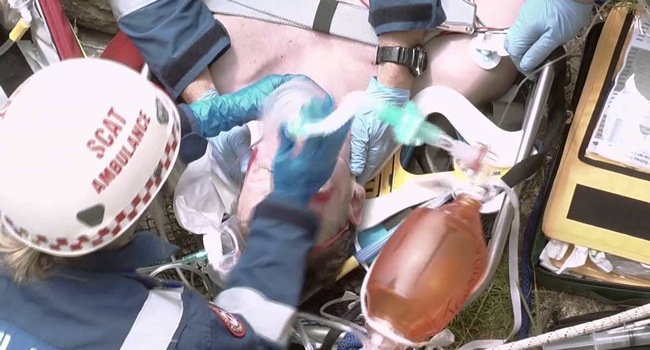
Prehospital RSI increases the rate of favorable neurologic outcome
RSI is the gold standard when we talk about intubation of a spontaneously breathing patient. On Slideshare we publish the randomized controlled trial from The Annals of Surgery about the original study from Australia. Authors are:
Stephen A. Bernard, MD, Vina Nguyen, BSc, Peter Cameron, MD, Kevin Masci, Mark Fitzgerald, MBBS, David J. Cooper, MD, Tony Walker, B Paramed Std, MEd, Paul Myles, MD, Lynne Murray, BAppSc David, McD, Taylor, MD, Karen Smith, BSc, MEd, PhD, Ian Patrick, John Edington, MB, ChB§, Andrew Bacon, MBBS§, Jeffrey V. Rosenfeld, MD, MS‡,¶, and Rodney Judson, MBBS
Objective: To determine whether paramedic rapid sequence intubation in patients with severe traumatic brain injury (TBI) improves neurologic outcomes at 6 months compared with intubation in the hospital.
Background: Severe TBI is associated with a high rate of mortality and long-term morbidity. Comatose patients with TBI routinely undergo endo-trachealintubation to protect the airway, prevent hypoxia, and control ventilation. In many places, paramedics perform intubation prior to hospital arrival. However, it is unknown whether this approach improves outcomes.
Methods: In a prospective, randomized, controlled trial, we assigned adults with severe TBI in an urban setting to either prehospital rapid sequence intubation by paramedics or transport to a hospital emergency department for intubation by physicians. The primary outcome measure was the median extended Glasgow Outcome Scale (GOSe) score at 6 months. Secondary end-points were favorable versus unfavorable outcome at 6 months, length of intensive care and hospital stay, and survival to hospital discharge.
Results: A total of 312 patients with severe TBI were randomly assigned to paramedic rapid sequence intubation or hospital intubation. The success rate for paramedic intubation was 97%. At 6 months, the median GOSe score was 5 (interquartile range, 1–6) in patients intubated by paramedics compared with 3 (interquartile range, 1–6) in the patients intubated at hospital (P = 0.28).
The proportion of patients with favorable outcome (GOSe, 5–8) was 80 of 157 patients (51%) in the paramedic intubation group compared with 56 of 142 patients (39%) in the hospital intubation group (risk ratio, 1.28; 95% confidence interval, 1.00–1.64; P = 0.046). There were no differences in intensive care or hospital length of stay, or in survival to hospital discharge.
Conclusions: In adults with severe TBI, prehospital rapid sequence intubation by paramedics increases the rate of favorable neurologic outcome at 6 months compared with intubation in the hospital.



